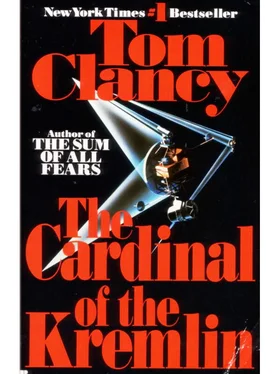Tom Clancy - The Cardinal of the Kremlin
Здесь есть возможность читать онлайн «Tom Clancy - The Cardinal of the Kremlin» весь текст электронной книги совершенно бесплатно (целиком полную версию без сокращений). В некоторых случаях можно слушать аудио, скачать через торрент в формате fb2 и присутствует краткое содержание. Год выпуска: 1988, Жанр: Триллер, на английском языке. Описание произведения, (предисловие) а так же отзывы посетителей доступны на портале библиотеки ЛибКат.
- Название:The Cardinal of the Kremlin
- Автор:
- Жанр:
- Год:1988
- ISBN:нет данных
- Рейтинг книги:3 / 5. Голосов: 1
-
Избранное:Добавить в избранное
- Отзывы:
-
Ваша оценка:
- 60
- 1
- 2
- 3
- 4
- 5
The Cardinal of the Kremlin: краткое содержание, описание и аннотация
Предлагаем к чтению аннотацию, описание, краткое содержание или предисловие (зависит от того, что написал сам автор книги «The Cardinal of the Kremlin»). Если вы не нашли необходимую информацию о книге — напишите в комментариях, мы постараемся отыскать её.
The Cardinal of the Kremlin — читать онлайн бесплатно полную книгу (весь текст) целиком
Ниже представлен текст книги, разбитый по страницам. Система сохранения места последней прочитанной страницы, позволяет с удобством читать онлайн бесплатно книгу «The Cardinal of the Kremlin», без необходимости каждый раз заново искать на чём Вы остановились. Поставьте закладку, и сможете в любой момент перейти на страницу, на которой закончили чтение.
Интервал:
Закладка:
Neither was Lieutenant General Bill Parks. His spacious office included a desk, a low table for coffee and intimate talks, and a larger conference table. The walls were covered with framed photographs of various space activities, along with numerous models of real and imagined space vehicles… and weapons. Parks was usually a genial man. A former test pilot, he'd marched through a career so accomplished that one would expect a bluff-hearty handshaker to have done it. Instead, Parks was an almost monkish person, with a smile that was at once engagingly shy and quietly intense. His many ribbons did not adorn his short-sleeved shirt, only a miniature of his command-pilot's wings. He didn't have to impress people with what he'd done. He could do so with what he was. Parks was one of the brightest people in government, certainly in the top ten, perhaps in the top one. Gregory saw that the General had company tonight.
"We meet again, Major," Ryan said, turning. In his hands was a ring binder of perhaps two hundred pages that he was halfway through.
Gregory came to attention – for Parks – and reported-as-ordered, sir.
"How was the flight?"
"Super. Sir, is the soda machine in the same place? I'm a little dried out."
Parks grinned for half a second. "Go ahead, we're not in that much of a hurry.
"You have to love the kid," the General said after the door closed behind him.
"I wonder if his mom knows what he's doing after school." Ryan chuckled, then turned serious. "He hasn't seen any of this yet, right?"
"No, we didn't have time, and the Colonel from the Cobra Belle won't be here for another five hours."
Jack nodded. That was why the only CIA people here were himself and Art Graham from the satellite unit. Everyone else would get a decent night's sleep while they prepared the full briefing for tomorrow morning. Parks could have skipped it himself and left the work to his senior scientists, but he wasn't that sort of man. The more Ryan saw of Parks, the more he liked him. Parks fulfilled the first definition of a leader. He was a man with a vision – and it was a vision with which Ryan agreed. Here was a senior man in uniform who hated nuclear weapons. That wasn't terribly unusual – people in uniform tend to be rather tidy, and nuclear weapons make for a very untidy world. Quite a few soldiers, sailors, and airmen had swallowed their opinions and built careers around weapons that they hoped would never be used. Parks had spent the last ten years of his career trying to find a way to eliminate them. Jack liked people who tried to swim against the tide. Moral courage was more rare a commodity than the physical kind, a fact as true of the military profession as any other.
Gregory reappeared with a can of Coca-Cola from a machine near the door. Gregory didn't like coffee. It was time for work.
"What gives, sir?"
"We have a videotape from Cobra Belle. They were up to monitor a Soviet ICBM test. Their bird – it was an SS-25 – blew, but the mission commander decided to stay up and play with his toys. This is what he saw." The General lifted the remote-control for the VCR and thumbed the Play button.
"That's Cosmos-1810," Art Graham said, handing over a photograph. "It's a recon bird that went bad on them."
"Infrared picture on the TV, right?" Gregory asked, sipping at his Coke. "God!"
What had been a single dot of light blossomed like an exploding star in a science-fiction movie. But this wasn't science fiction. The picture changed as the computerized imaging system fought to keep up with the energy burst. At the bottom of the screen a digital display appeared, showing the apparent temperature of the glowing satellite. In a few seconds the image faded, and again the computer had had to adjust to keep track on the Cosmos.
There was a second or two of static on the screen, then a new image began to form.
"This is ninety minutes old. The satellite went over Hawaii a few orbits later," Graham said. "We have cameras there to eyeball the Russian satellites. Look at the shot I gave you."
" 'Before' and 'After,' right?" Gregory's eyes flicked from one image to another. "Solar panels are gone… wow. What's the body of the satellite made of?"
"Aluminum, for the most part," Graham said. "The Russians go in for ruggeder construction than we do. The internal frames may be made of steel, but more likely titanium or magnesium."
"That gives us a top-end figure for the energy transfer," Gregory said. "They killed the bird. They got it hot enough to fry the solar cells right off, and probably enough to disrupt the electrical circuitry inside. What height was it at?"
"One hundred eighty kilometers."
"Sary Shagan or that new place Mr. Ryan showed me?"
"Dushanbe," Jack said. "The new one."
"But the new power lines aren't finished yet."
"Yeah," Graham observed. "They can at least double the power we just saw demonstrated. Or at least they think they can." His voice was that of a man who had just discovered a fatal disease at work on a family member.
"Can I see the first sequence again?" Gregory said. It was almost an order. Jack noted that General Parks carried it out at once.
This continued for another fifteen minutes, with Gregory standing a bare three feet from the television monitor, drinking his Coke and staring at the screen. The last three times, the picture was advanced frame by frame while the young Major took notes at every one. Finally he'd had enough.
"I can have you a power figure in half an hour, but for the moment, I think they've got some problems."
"Blooming," General Parks said.
"And aiming difficulty, sir. At least, it looks like that, too. I need some time to work, and a good calculator. I left mine at work," he admitted sheepishly. There was an empty pouch on his belt, next to his beeper. Graham tossed one over, an expensive Hewlett-Packard programmable.
"What about the power?" Ryan asked.
"I need some time to give you a good number," Gregory said as though to a backward child. "Right now, at least eight times anything we can do. I need a quiet place to work. Can I use the snack room?" he asked Parks. The General nodded, and he left.
" Eight times…" Art Graham observed. "Christ, they might be able to smoke the DSPS birds. It's for damned sure they can wreck any communications satellite they want. Well, there are ways to protect them…"
Ryan felt a little left out. His education was in history and economics, and he hadn't quite learned the language of the physical sciences yet.
"Three years," General Parks breathed as he poured some coffee. "At least three years ahead of us."
"Only in power throughput," Graham said.
Jack looked from one to another, knowing the significance of what they were worried about, but not its substance. Gregory came back in twenty minutes.
"I make their peak power output something between twenty-five and thirty million watts," he announced. "If we assume six lasers in the transmission assembly, that's – well, that's enough, isn't it? It's just a matter of racking enough of them together and directing them at a single target.
"That's the bad news. The good news is, they definitely had blooming problems. They only delivered peak power on target for the first few thousandths of a second. Then it started blooming out on them. Their average power delivery was between seven and nine megawatts. And it looks like they had an aiming problem on top of the blooming. Either the mounts aren't shock-mounted properly or they can't correct for the earth's rotational jitter. Or maybe both. Whatever the actual reason, they have trouble aiming more accurately than three seconds of arc. That means they're only going to accurate plus or minus two hundred forty meters for a geostationary satellite – of course, those targets are pretty stationary, and the movement factor could count either way."
Читать дальшеИнтервал:
Закладка:
Похожие книги на «The Cardinal of the Kremlin»
Представляем Вашему вниманию похожие книги на «The Cardinal of the Kremlin» списком для выбора. Мы отобрали схожую по названию и смыслу литературу в надежде предоставить читателям больше вариантов отыскать новые, интересные, ещё непрочитанные произведения.
Обсуждение, отзывы о книге «The Cardinal of the Kremlin» и просто собственные мнения читателей. Оставьте ваши комментарии, напишите, что Вы думаете о произведении, его смысле или главных героях. Укажите что конкретно понравилось, а что нет, и почему Вы так считаете.






![Александр Ирвин - Tom Clancy’s The Division 2. Фальшивый рассвет [litres]](/books/417744/aleksandr-irvin-tom-clancy-s-the-division-2-falsh-thumb.webp)





